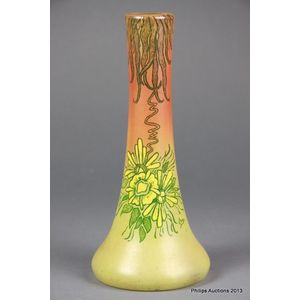Art Nouveau Legras Glass Vase with Enamel Foliage Design
You must be a subscriber, and be logged in to view price and dealer details.
Subscribe Now to view actual auction price for this item
When you subscribe, you have the option of setting the currency in which to display prices to $Au, $US, $NZ or Stg.
- Polychrome - Made or finished in many colours. For furniture, it is used to indicated a painted finish.
- Circa - A Latin term meaning 'about', often used in the antique trade to give an approximate date for the piece, usually considered to be five years on either side of the circa year. Thus, circa 1900 means the piece was made about 1900, probably between 1895 and 1905. The expression is sometimes abbreviated to c.1900.
- Art Nouveau Period - The Art Nouveau period was a cultural movement that emerged in the late 19th century, and was characterized by its emphasis on natural forms, flowing lines, and a decorative, ornamental style. Art Nouveau was a reaction against the ornate and heavily stylized designs of the previous era, and sought to create a new, more organic aesthetic.
Art Nouveau was characterized by its use of sinuous, curving lines, as well as a focus on natural elements such as flowers, vines, and other organic shapes. Art Nouveau designers sought to create a total work of art, in which every element of a building or object was designed to be harmonious with the overall design.
Some of the most iconic examples of Art Nouveau design include the Paris Metro entrances designed by Hector Guimard, the works of the artist Alphonse Mucha, and the architecture of Victor Horta in Brussels.
The Art Nouveau period was at its peak between 1890 and 1910, but began to decline in popularity by the start of World War I. However, Art Nouveau remains an important influence on design and art to this day, and continues to be celebrated for its emphasis on natural forms and decorative style.
This item has been included into following indexes:
Visually similar items

An enamel decorated vase attributed to Legras Et Cie, early 20th century. the long tapering vase to a spreading base flowing from a squared fire polished rim, with a design of sinuous trees and a lake in brown and rough cast textured green over a pale turq

Modern Moorcroft specimen vase Florian flame pattern, signed R Bishop 2009, no 119, 24.5 cm height, boxed

An Art Nouveau style, Daum Nancy cameo glass vase the vase is cameo cut decoration depicting flowering orange poppies with leafy green stems. Engraved signature to base: 'Daum Nancy' with the cross of Lorraine. Height 36.5 cm

Art Nouveau Daum Nancy cameo glass vase, early 20th century, leaves and berries design, decorated with four colour glass cameo on a mottled, yellow and opaque ground, signed 'Daum Nancy' with cross of Lorraine in cameo. Height 60 cm
